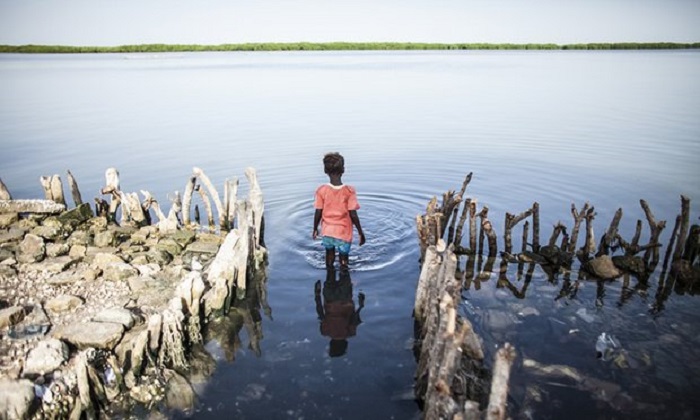Poor countries urge fast action on Paris deal to stop catastrophic warming

But, say scientists, the historic measures pledged in Paris last year by the big greenhouse gas emitters like Europe, the US and China set the world on track to a temperature rise of about 3C over the next 50 years – enough to render many of the world’s poorest countries uninhabitable.
The world’s 48 least developed countries (LDCs), which unanimously pressed for a global commitment to a 1.5C warmer world in Paris, said this week that they welcomed the ratification of the agreement, but warned that the rich must act urgently.
“Now we need to now turn our words into action. Without action, the Paris agreement will just be a piece of paper,” said Hilda Heine, president of the Marshall Islands. “We need to see finance quickly flow to those who need it most so we can all implement our own ambitious plans to reduce emissions. Without [that] there is no way we will be able to stay within 1.5 degrees.”
Abdallah Wafy, Niger’s ambassador to the UN, added: “Despite Africa’s insignificant contribution to the causes of climate change, it is suffering from drought, flooding, climate-induced displacement and other climate-related challenges. The international community should accelerate efforts to curb those negative effects.”
Jan Eliasson, deputy secretary general of the UN, told a meeting of LDCs in New York that their ability to act on their commitments will be a challenge. “They need the support of international partners,” he said.
Developing countries played a major role in Paris even though they have been barely responsible for historic global warming. China committed to peaking its emissions and obtaining 20% of all its energy from non-fossil sources by 2030, Brazil to cutting emissions by 37% and India plans to triple its renewable energy capacity by 2022.
The LDCs also committed to make major changes in the way they develop. Ethiopia and many other African countries said they planned to vastly expand wind, solar and hydro power, and to reforest large areas.
But finding the money to allow them to meet their commitments will be hard, said the International Institute for Environment and Development (IIED). In a report published at the climate summit, the institute calculated it would cost the 48 countries around $93bn (£73bn) a year, or close to $1tn in total to meet their commitments.
“Countries’ swift action in ratifying the Paris agreement should be celebrated, and means it will come into force at unprecedented speed. But for it to be effective and fair, developed countries must live up to and increase their commitments and prioritise raising and investing international climate finance within the least developed countries,” said the IIED’s director, Andrew Norton.
A UN report calculated that the cost for all developing countries to adapt to climate change could go as high as $500bn a year by 2050 – four to five times higher than previous estimates.
Where the money is going to come from is uncertain. Rich countries have agreed to “mobilise” $100bn a year from 2020 onwards but the details are still vague. Much of the money is expected to be channelled through the Green Climate Fund, which has been set up and has attracted nearly $10bn, but is said by developing countries to be bureaucratic, slow and inaccessible.
“There is still a lot of hard work ahead. Small island states and developing countries know only too well the scale of the challenge. Families and communities are already feeling the devastating effects of climate change. Our fear is that extreme weather events like hurricane Matthew in the Caribbean will become the norm, not the exception,” said Patricia Scotland, secretary general of the Commonwealth as finance ministers met in Washington to discuss the funds required for climate mitigation and adaption on Thursday.
“All of us – governments, experts and civil society – need to work together, collaboratively, if we’re to make a true difference,” she added.
Rich countries have a bad record on meeting their climate pledges to the most vulnerable countries. Oxfam has estimated that in 2014 just 16% of total climate finance was channelled towards poorer countries.
“The Paris agreement’s credibility test starts today. Each and every country has pledged to cut their greenhouse gas emissions, but our world is still on track to warm up to 3C or more, much higher than the agreement’s stated goal of 1.5C. Countries will need to quickly and aggressively cut their greenhouse gas emissions further,” said an Oxfam spokeswoman.
“Only a fraction of the money that rich countries are spending on climate change is reaching the most vulnerable communities that desperately need it most. Figuring out how to close this gap and strengthen the resilience of these communities should be high on the list of priorities ahead of next month’s UN climate change conference in Morocco.”
Oxfam called on countries to target 35% of funding by 2020, and 50% by 2025. “The share is not only too low, it is also declining. It was 21% in 2013. No share or specific amount has been agreed for vulnerable countries in the Paris agreement,” the spokeswoman said.















































